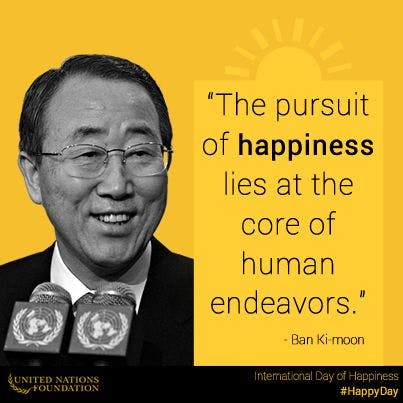
In the plethora of UN declared international days of this and that, perhaps the most all-embracing, aspirational, and eventually the most ultimate is March 20 – the International Day of Happiness!
In 2011, the UN General Assembly adopted a resolution which recognized happiness as a “fundamental human goal” and called for “a more inclusive, equitable, and balanced approach to economic growth that promotes the happiness and well-being of all peoples;” and in 2012, it decreed that March 20 would be the day each year to reaffirm our commitment to the goal of universal happiness and to the “right” of every person to happiness.
As we reflect on the seemingly unending conflicts in every part of the world, the assaults on human (and especially women’s and minorities’) dignity and rights everywhere, the frequent disinclination to let individuals lead the lives they wish to live, it is unsurprising that many of us feel cynical about this day being little more than another occasion for platitudes. But platitudes often hide deeper truths and this might be a good time to review our current knowledge on the practical basis of happiness.
In The Conquest of Happiness, a wonderful little book published in 1930 and perhaps the first practical self-help book published for modern life, the philosopher Bertrand Russell reflected on the personal attributes that the citizen of a developed country needed to cultivate to overcome the feelings of unhappiness and disenchantment that economic progress seemed not to have dissipated. Among these attributes he included a zest for life, a love of effort, and a disavowal of self-absorption, envy, fear, anxiety, and nervous fatigue.
Russell acknowledged that he was advising societies in which basic needs had been met. But what about sources of happiness for those still struggling to survive? The large and growing research literature on happiness reminds us that the old blessing of “healthy, wealthy, and wise” does actually, at least partly, seek to bestow the gift of happiness. What does this literature tell us?
First, that abject poverty is bad for happiness (notwithstanding the stories about the smiles on the faces of the poor), but nor is there a linear positive relationship between income/wealth and happiness. We do need enough money to lead a reasonably happy life but, beyond a point, additional income does not seem to do much for our sense of joy. It does even less when that additional income is not as large as our neighbor’s additional income – that is, relative income has a surprising and unfortunate bearing on our sense of self-worth and happiness. And that is perhaps one more reason for us to decry the growing income inequalities in our 21st century world.
Secondly, good health, especially when bad health is preventable and especially when the notion of health encompasses the World Health Organization’s broad definition of it, does add greatly to one’s happiness. The good health of one’s loved ones, children in particular, is also an important source of happiness.
Third: wisdom. While only a very few of us might be fortunate enough to acquire the wisdom of the sages, access to basic education for all and advanced education for those that want it is key to the kind of happiness that comes to the curious mind, the questioning mind, and the knowledgeable mind – a happiness that is active rather than passive and self-directed rather than controlled by outside forces.
Once these three needs – for learning, for health, for an escape from poverty – (and a fourth one recommended by Russell – interesting work) are satisfied, populations and individuals might still not be “happy” in a conventional sense but they will be ready to then follow Russell’s advice on next steps.
The Sustainable Development Goals therefore are right on target to focus so much on universal good health, satisfactory work, education, and poverty eradication. Progress on the goals related to these four things will be progress on the goal of happiness as a “right,” making the International Day of Happiness a celebration of something more than platitudes.
I can only end this blog by defining eventual happiness as the achievement of goals that Bertrand Russell, on his 80th birthday, said had guided his life: “I have lived in the pursuit of a vision, both personal and social. Personal: to care for what is noble, for what is beautiful, for what is gentle; to allow moments of insight to give wisdom at more mundane times. Social: to see in imagination the society that is to be created, where individuals grow freely, and where hate and greed and envy die because there is nothing to nourish them. These things I believe, and the world, for all its horrors, has left me unshaken.”



 View All Blog Posts
View All Blog Posts